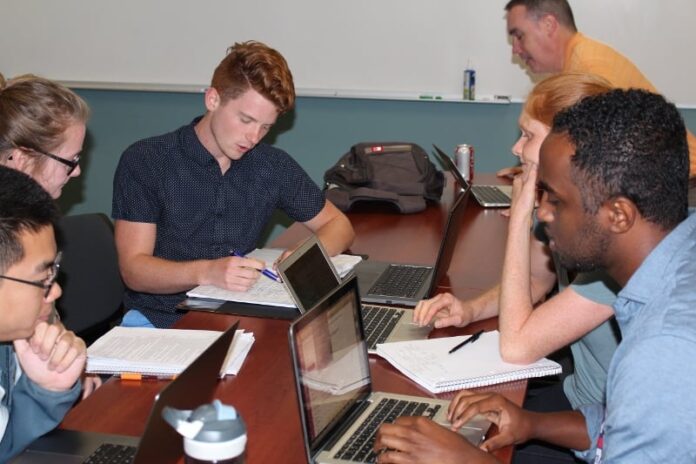
The sparkling red brick and glass buildings in the Virginia Tech – Carilion corridor continue to bring Roanoke more than beautiful structures that often show reflections of the surrounding mountainous landscape. The cutting edge facilities downtown evidence the synergistic VT – Carilion relationship that is likely proving to be even more beneficial and powerful than those who first conceived of a partnership more than a decade ago.
While the medical school is often top-of-mind, the biomedical research facilities and attendant on-site degree programs contribute to bringing advancements that will impact how medicine, biotech and healthcare are done.
VTs Pamplin College of Business and its Apex Center for Entrepreneurs is increasingly a catalyst for bringing medical and health research ideas to market. By planting entrepreneurial seeds in the minds of present and future researchers in the program, the Roanoke campus helps make that possible.
“What if you started your first course in grad school with no syllabus, no textbooks or even a reading list? For some students in an engineering or medical graduate school this might be a time to freak out!” said Derick Maggard, executive director of the Apex Center for Entrepreneurs and an instructor for “Intro to Commercialization of Biomedical/Health Science Intellectual Property.”
“But for TBMH students in Virginia Tech’s graduate program, we start them all with a clean sheet of paper and offer guidance on writing a business plan which could actually be commercialized and come to market.”
Leading the 17 member class held at the Virginia Tech Carilion Research Institute on Riverside Drive recently, Maggard tells the PhD students that “our role is to help students start companies.”

Lauren Bochicchio has just started VT’s PhD TBMH program and is currently studying the immune response to traumatic brain injury. “We have some findings that have huge implications for TBI, for which there’s really no treatment. We are investigating a very simple drug that would accelerate the healing process and minimize tissue damage. This would affect soldiers coming back from war for instance.”
Bochicchio, who graduated from VT with a triple major in physics, biological systems engineering and clinical neuroscience, says “this class is very cool because I’ve never been in a science class where they talked about intellectual property, patenting something, or creating a business; usually the focus is to do your science and to publish. It’s good to introduce the concept to first year PhD students so they can think about that as they are doing their research.”
The Virginia Tech Carilion Biomedical Research Expansion, under way across the street from the Virginia Tech Carilion Research Institute where the TBMH classes are held, is creating excitement even while the structure is in the earliest stages of construction. “Carilion is becoming the crown jewel of downtown Roanoke. The new building the community is seeing going up will house additional labs,” said Maggard.
Keith Baugh was a molecular biology undergrad at Fort Lewis College in Durango, Colorado and is excited about pursuing his PhD through Virginia Tech’s TBMH program. “This training is to make sure you’re speaking the right language to get investments and get through regulations so the research can reach people and help people. This program trains students on how to develop the science, get a patent and take a product to market. A bonus of the program is that medical students take classes with business students and engineering students, giving them a unique opportunity to form valuable connections beyond their traditional academic program,” said Baugh.
UNC graduate Grace Blair has been an entrepreneur in her own right—as a co-op bike store owner. The experience taught her a great deal about how to run a business including “how to run the back end,” said Blair. Her BS in biology and stints working in highly respected labs including NIH and Johns Hopkins in Baltimore and UCSF in San Francisco gave her insight into “how labs function and how to be a part of a lab community.”
Blair chose the program because she wants to learn the basics of biotech and medical start-ups. “I didn’t notice I had the entrepreneur bug until I came back to VT and I now understand how you can have both a career track and a dream. A mentor at my lab at VT was part of a health start-up and he helped me focus on medical start-ups and ways to move forward in my own search.”
The ‘end game’ thinking that is foundational in planning an entrepreneurial approach to science is key.
“This is a way to help bring what we are doing in the lab and allow it to impact the actual population. By introducing researchers to the idea of bringing products from the lab to market completes the circle—bringing taxpayer dollars back to the taxpayers,” said Bochicchio.
Maggard said, “The courses might become a feeder system for the Apex Center for Entrepreneurs and our Entrepreneur Challenge as well. There is so much high-level thinking here with our Roanoke grad school students and faculty working collaboratively. Great new healthcare IT and biotechnology businesses and jobs are emerging right here in Roanoke.”
Calling All Hokies:
For those who find themselves wistful that the Apex program sounds super exciting but inaccessible, it turns out that VT support for entrepreneurs isn’t limited to high level science initiatives or even to graduate students. Apex Center for Entrepreneurs “provides any Hokie, from any major and any year the opportunity to engage in all phases of the entrepreneurship and innovation process, and encourages alumni to interface with the next generations of entrepreneurs.”
Visit https://www.apex.vt.edu/about/ for more information.
Cheryl Vosburg

